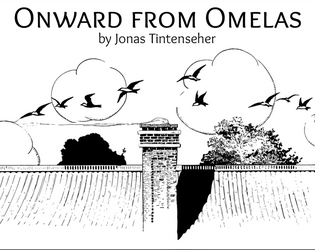Play liminal zine
Onward from Omelas's itch.io pageAnything else you want to tell people about your game?
Onward from Omelas is based on i'm sorry did you say street magic. It's a short game about liminal cities and their secrets. I hope you like it.
Leave a comment
Log in with itch.io to leave a comment.




Comments
Thank you for this. I think it’s wonderful. It is lucidly written, ambitious in scope, and filled with careful and imaginative choices.
I like the idea that ‘tempestuous’ or ‘superficial’ could be the Foundation of a city -- feels like there’s a truth to that.
I wondered if players might need a few more hints to build a broadly POSITIVE vision (especially if they’re unfamiliar with Le Guin’s story)?
I also wondered a bit about the “Pulling Back the Curtain” and ‘Walking Away’ sections. I really like how you dramatise a kind of ideology critique -- the way you invite players to reimagine everything afresh, and see the Secret running through everything all along. I also like the burning and the deleting.
On the other hand, the wording seems to imply that the city falls merely from its dark secret(s) becoming public. Is that right? Perhaps the game could give a little more scope for players to imagine different outcomes? Who knew the Secret, and who didn’t? Perhaps everyone knew the Secret? Did the Secret ‘come to light,’ or did its meaning alter? Did the city fall? If so, was it to do with the Secret, or something else? Who walked away, and who stayed? Perhaps everyone walked away? Perhaps no one? Is the city still standing today?
Those difficult questions feel resonant with the ending of Le Guin’s story. In Le Guin’s story, of course, everybody does know the ‘Secret,’ apart from the very young.
(That is what makes Omelas so close to the world we actually live in, where those who work, consume, and live in relative comfort are borne on the backs of the laboring poor -- and know we do. I don’t think the story is as anti-utopian as it is often treated. I also think Le Guin invites a complicated compassion for the ones who stay in Omelas).
Thank you again for this absolutely beautiful work.
PS: I co-wrote an essay on secrets (in poetry) you miiight just be interested in: https://poetry.openlibhums.org/article/id/709/
Thank you so much for this incredible feedback (and for hosting the jam!). Your notes are well-taken and your praise is humbly accepted :)
You're absolutely right re: how the game lines up with Le Guin's Omelas and its interpretations. I did stray from what even I took from the short story, mostly to help direct the gameplay, but, in the spirit of the jam and the current state of the world, I think the game does deserve to be more optimistic, and I'm more than happy to incorporate your thoughts in a new draft.
And thank you for linking this essay — I'm very much looking forward to reading it!